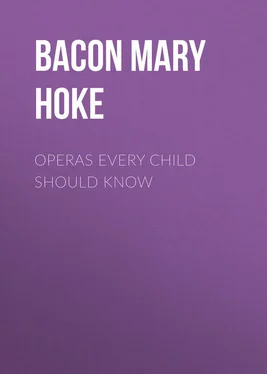Mary Bacon - Operas Every Child Should Know
Здесь есть возможность читать онлайн «Mary Bacon - Operas Every Child Should Know» — ознакомительный отрывок электронной книги совершенно бесплатно, а после прочтения отрывка купить полную версию. В некоторых случаях можно слушать аудио, скачать через торрент в формате fb2 и присутствует краткое содержание. Жанр: foreign_antique, foreign_prose, на английском языке. Описание произведения, (предисловие) а так же отзывы посетителей доступны на портале библиотеки ЛибКат.
- Название:Operas Every Child Should Know
- Автор:
- Жанр:
- Год:неизвестен
- ISBN:нет данных
- Рейтинг книги:4 / 5. Голосов: 1
-
Избранное:Добавить в избранное
- Отзывы:
-
Ваша оценка:
- 80
- 1
- 2
- 3
- 4
- 5
Operas Every Child Should Know: краткое содержание, описание и аннотация
Предлагаем к чтению аннотацию, описание, краткое содержание или предисловие (зависит от того, что написал сам автор книги «Operas Every Child Should Know»). Если вы не нашли необходимую информацию о книге — напишите в комментариях, мы постараемся отыскать её.
Operas Every Child Should Know — читать онлайн ознакомительный отрывок
Ниже представлен текст книги, разбитый по страницам. Система сохранения места последней прочитанной страницы, позволяет с удобством читать онлайн бесплатно книгу «Operas Every Child Should Know», без необходимости каждый раз заново искать на чём Вы остановились. Поставьте закладку, и сможете в любой момент перейти на страницу, на которой закончили чтение.
Интервал:
Закладка:
"Ah!" he cried, "the memories that overwhelm me! Oh, my weak and trembling spirit, wilt thou surely ascend to heaven, borne upward by this holy song!" He began to think of his happy boyhood, of his early home; then as the glorious music of the choir swelled higher and higher, he became gentler and thought more tolerantly of life.
"Those soft melodious strains bring peace to my soul; songs more sweet than morning, I hear again! My tears spring forth, the earth has won me back." He dropped his head upon his breast and wept. As he sat thus, in tender mood, a strange happening took place. A queer, explosive sound, and a jet of flame, and – there stood the devil, all in red, forked tail, horns, and cloven hoof! He stood smiling wickedly at the softened old man, while Faust stared at him wildly.
"A most pious frame of mind, my friend. Give me your hand, dear Doctor Faust. The glad Easter ringing of bells and singing of peans have certainly charmed you back to earth!"
"Who art thou, whose glances are so fierce? They burn my very soul. Speak, thou spectre, and tell me thy name." From his very appearance, one could hardly doubt he was the Devil.
"Why! so learned a man as you should know me. I am thy friend and comfort. Come, ye are so melancholy, Doctor Faust, let me be thy friend – I'll tell thee a secret: if you but say the word, I'll give ye your dearest wish. It shall be whatever you wish. Eh? Shall it be wealth, or fame? – what shall it be? Come! Let us talk it over."
"That is well, wretched demon! I think I know ye now. I am interested in ye. Sit, and we shall talk," the poor old Doctor replied, despising that which nevertheless aroused his curiosity. He, like everybody else, had heard of the Devil, but he doubted if any other had had the fortune actually to see him.
"Very well; I will be thine eye, thine ear. I will give thee the world; thou shalt leave thy den, thy hateful study. Come! to satisfy thy curiosity, follow me."
The old man regarded him thoughtfully for a moment, and then rose:
"Let us go," he said, and in the twinkle of an eye they disappeared into the air.
They were transported over hill and dale, village and fine city, till the Devil paused at Leipzig.
"Here is the place for us," he said; and instantly they descended to the drinking cellar of Auerbach, a man who kept fine Rhenish wine for jolly fellows.
They entered and sat at a table. By this time the Devil had changed Faust the scholar, into a young and handsome man, youth being one of Faust's dearest wishes.
All about them were coarse youths, soldiers, students, men off the street, all drinking and singing gaily. Faust and the Devil ordered wine and became a part of the company. They were all singing together at that moment:
Oh, what delight when storm is crashing,
To sit all the night round the bowl;
High in the glass the liquor flashing,
While thick clouds of smoke float around.
The rest of the words were not very dignified nor fascinating, and Faust looked on with some disgust. Presently some one cried out to a half-drunken fellow named Brander to give them one of his famous songs, and he got unsteadily upon his feet and began:
There was a rat in the cellar-nest
Whom fat and butter made smoother;
He had a paunch beneath his vest
Like that of Doctor Luther;
The cook laid poison cunningly,
And then as sore oppressed was he,
As if he had love in his bosom.
He ran around, he ran about,
His thirst in puddles laving;
He gnawed and scratched the house throughout,
But nothing cured his raving;
He whirled and jumped with torment mad,
And soon enough the poor beast had,
As if he had love in his bosom.
And driven at last, in open day,
He ran at last into the kitchen,
Fell on the hearth and squirming lay
In the last convulsion twitching;
Then laughed the murd'ress in her glee,
"Ha, ha! He's at his last gasp," said she,
As if he had love in his bosom.
"Requiescat in pace, amen!" the Devil sang, and all joined on the "amen." "Now then, permit me to sing you a ballad," the Devil cried, gaily, and he jumped upon his feet.
"What, you pretend that you can do better than Brander?" they demanded, a little piqued.
"Well, you see, I am expert at anything nasty and bad; so let us see:
There was a king once reigning,
Who had a big black flea,
And loved him past explaining,
As his own son were he.
He called his man of stitches,
The tailor came straightway,
'Here, measure the lad for breeches,
And measure his coat, I say.'
In silk and velvet gleaming,
He now was wholly drest,
Had a coat with ribbons streaming,
A cross upon his breast.
He had the first of stations,
A minister's star and name,
And also his relations,
Great lords at court became.
And lords and dames of honour
Were plagued awake and in bed.
The Queen, she got them upon her,
The maids were bitten and bled.
And they did not dare to brush them,
Or scratch them day or night.
We crack them and we crush them,
At once whene'er they bite."
"Enough!" said Faust; "I want to leave this brutal company. There can be no joys found where there is so much that is low and degrading. I wish to go." And turning angrily to the Devil, he signified that he would leave instantly.
"Very well," said the Prince of Darkness, smiling his satirical smile. "Away we go – and better success with thee, next time." At which he placed his mantle upon the ground, they stood upon it, and away they flew into the air and disappeared.
When next they stopped, it was upon a grassy bank of the Elbe River.
"Now, my friend; let us rest. Lie thou down upon the grassy bank and close thine eyes, and dream of joys to come. When we awake we shall wish again and see what new experience the world holds for us. Thus far you do not seem too well satisfied."
"I will sleep," Faust answered, reclining upon the bank. "I should be glad to forget some things that we have seen." So saying he slept. No sooner had he done so, that the Devil summoned the most beautiful sylphs to dance before him, and thus to influence Faust's dreams. They began by softly calling his name. Then they lulled him to deeper sleep, and his dream was of fair women. In his dream he saw the lovely dance, the gracious forms, the heavenly voices of youthful women. The Devil directed his dream-laden eyes toward a loving pair who walked and spoke and loved apart. Then immediately behind those lovers walked, meditatively, a beautiful maiden.
"Behold," the Black Prince murmured to Faust; "that maiden there who follows: she shall be thy Marguerite. Shall it not be so?" And Faust sank back in his sleep, overcome with the lovely vision. Then the Devil motioned the sylphs away.
"Away, ye dainty elves, ye have served my turn to-day, and I shall not forget." They danced to exquisite waltz music, hovering above Faust, and gradually disappeared in the mists of the air.
Slowly Faust awakened; His first word was "Marguerite!" Then he looked about him in a daze.
"What a dream! What a dream!" he murmured. "I saw an angel in human form."
"Nay, she was a woman," said the Devil. "Rise and follow me, and I will show her to thee in her home. Hello! Here comes along a party of jolly students and soldiers. They will pass her home. We'll move along with them, join their shouts and songs, and presently we shall arrive at her house." Faust, all trembling with the thought that at last he had found that which was to make his life worth living, joined the crowd and followed. The soldiers boisterously sang a fine chorus as they went. No sooner had they finished than the students began their song. It was all in Latin and seemed to Faust to echo that life which had once been his. Then the soldiers and students joined in the jollity and sang together.
Читать дальшеИнтервал:
Закладка:
Похожие книги на «Operas Every Child Should Know»
Представляем Вашему вниманию похожие книги на «Operas Every Child Should Know» списком для выбора. Мы отобрали схожую по названию и смыслу литературу в надежде предоставить читателям больше вариантов отыскать новые, интересные, ещё непрочитанные произведения.
Обсуждение, отзывы о книге «Operas Every Child Should Know» и просто собственные мнения читателей. Оставьте ваши комментарии, напишите, что Вы думаете о произведении, его смысле или главных героях. Укажите что конкретно понравилось, а что нет, и почему Вы так считаете.












